Projects
MALASPINA

The project "Circunnavigation Expedition Malaspina 2010: Global Change and Biodiversity Exploration of the Global Ocean" has been funded by the MICINN (CSD2008-00077). Led by Carlos Duarte (IMEDEA, CSIC), this Spanish project involves 19 national institutions and 16 foreign institutions. The project Malaspina aims:
- Assess the impact of global change on the ocean,
- Explore the deep-sea biodiversity,
- Analyze the repercussion of the expedition of Alejandro Malaspina,
- Promote marine science and knowledge in spanish society and
- Train and attract young researchers.
Two research vessels participate, the Sarmiento de Gamboa in the North Atlantic Ocean transect by 24 ºLN, and the BIO Hesperides in an expedition to circumnavigate the Earth, which represents the backbone of the scientific project. The research will be performed with more than 70,000 samples of air, water and plankton taken in 180 stations distributed over 33,000 miles through the Atlantic, Indian and Pacific Oceans, for 6 successive cruises throughout Cadiz - Rio de Janeiro - Cape Town - Perth - Sydney - Auckland - Honolulu - Panama - Cartagena de Indias - Cadiz. Our group aims to analyze the hydrolytic enzyme activities of the bacterioplankton in the global deep ocean, with special focus on their distribution, kinetic behavior, stability, relationship with organic matter and with bacterial diversity. The deep ocean is currently under-sampled, and therefore the analysis of microbial processes in these areas is of great importance, in some cases being the first contribution to the scientific community.
CAMBIO
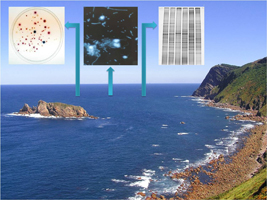
The research project "CAMBIO. Bacterioplankton diversity and function in the Eastern Bay of Biscay: Predation and Resources as Drivers of seasonal change" has been funded by the MICINN (CTM-2010-19308). Led by Juan Iriberri (UPV/EHU), this project will focus on:
- the specific composition and diversity of the bacterioplanktonic community in coastal waters of the Eastern Cantabria Sea,
- the identification of the seasonal changes in the relevant members of that community over multi-year time scale,
- the establishment of links between the taxonomic diversity and the physiological function of bacterioplankton, resulting in an optimization of available resources, and
- the relevance of protistan grazing, compared to other environmental factors, as a significant driver of the change of relevant members of the community.
The results obtained in this project will allow not only the generation of baselines, essential reference in future analysis of changing environmental conditions (anthropogenic warming, acidification, toxic wastes, etc.), but also achieve a higher predictive capability about the performance of the ecosystem under different seasonal conditions.
EFICIENCIA
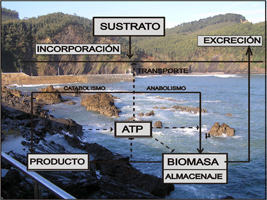
The research project "EFICIENCIA. Marine bacterioplanktonic growth efficiency and grazing by bacterivorous protists" has been funded by the MCYT (CTM-2006-08023). Led by Juan Iriberri (UPV/EHU), this project:
- proposes a specific protocol for the quantification of bacterial growth efficiency, which meets the conditions of minimum variance and maximum precision,
- analyzes the seasonal variability of bacterioplankton growth efficiency in coastal waters,
- relates the growth efficiency with the composition of the bacterial community,
- identifies the effect of predation by bacterivorous protists on the efficiency of bacterioplankton, and
- analyzes the value of the growth efficiency as an indicator of bacterial community adaptation to the environment.
This project is significant since the growth efficiency is the variable that best integrates those complementary metabolic processes that shape the bacterial energetic state. Moreover, its value reflects the balance between the production of new bacterial biomass and the respiration and production of CO2 from organic material in the marine ecosystem, being the CO2 the main greenhouse gas on the planet.
QUIMIC
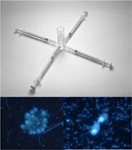
The research project "QUIMIC. Chemical communication in the interrelationship between bacteria and protozoa" was funded by the MCYT (BOS-2003-06211). Led by Juan Iriberri (UPV/EHU), this project investigated the existence of chemical-mediated communication between the bacterial and protozoan levels of the microbial food web in aquatic systems. The communication can occur in both directions. The excretion of chemical compounds can be used by bacterial communities as a defense mechanism against predation, while the ability of bacterivorous protists to detect chemical compounds generated by the prey will help protists to move to localized foci of bacterial growth. The importance of this research lies in the ability of protozoa to control biomass, activity and specific composition of the bacterial community in aquatic ecosystems.
DAMINO
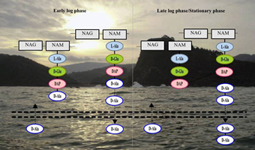
The research project "DAMINO. D-amino acids as indicators of biological productivity in coastal marine ecosystems" was funded by the MCYT (REN-2003-05276). Led by Marian Unanue (UPV/EHU), the project DAMINO was raised to:
- determine whether the enantiomeric composition of dissolved amino acids in the coastal ocean may reflect the state of degradation of organic matter and, therefore, serve as an indicator of biological productivity of the ecosystem, and
- comparatively analyze the use of L- and D- amino acids by bacterioplankton, both as monomers and in polymeric form.
The analysis of enantiomeric forms is a very novel field of research and important because it can provide information about the level of degradability of organic material in the marine environment.
DHARMA
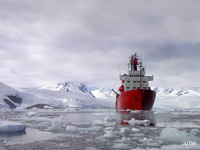
The research project "DHARMA. Diversity, Heterotrophy, Autotrophy and Relations among Antarctic Microorganisms" was funded by the CICYT (ANT-97-1155). Led by Carlos Pedrós-Alió (ICM, CSIC), the project involved researchers from six Spanish and one foreign institutions. The project was carried out in the waters of the Southern Ocean, in an oceanographic expedition on the BIO Hesperides research vessel where we sampled the Drake Passage waters, the Wedell Sea and the Gerlache Strait. The objectives of this project were:
- to analyze the diversity of microbial communities in surface and deep Antarctic waters, and
- to know the effects of temperature on the different activities of microbial plankton.
Our group was responsible for analyzing the degradation processes of polymeric organic matter carried out by the bacterioplankton.
